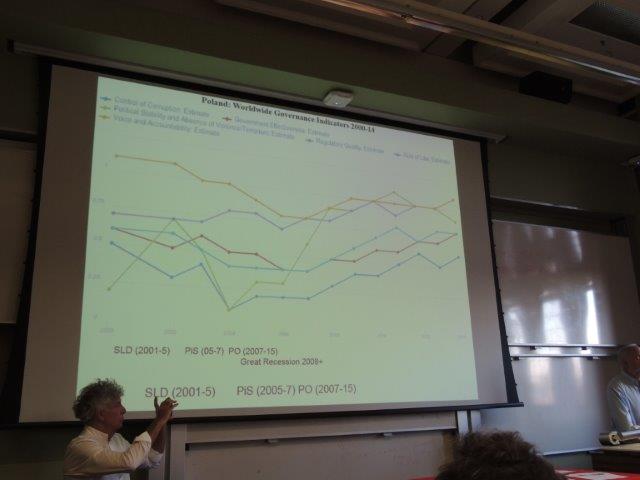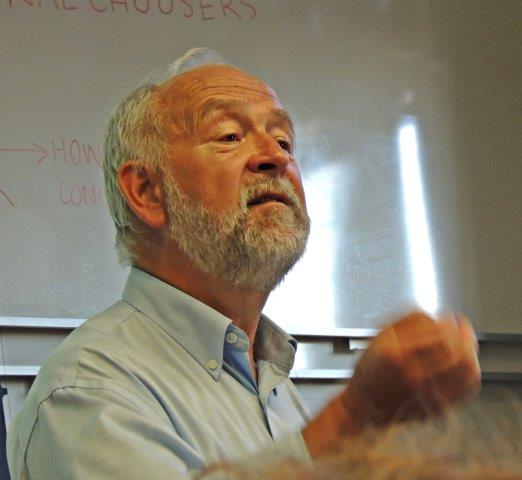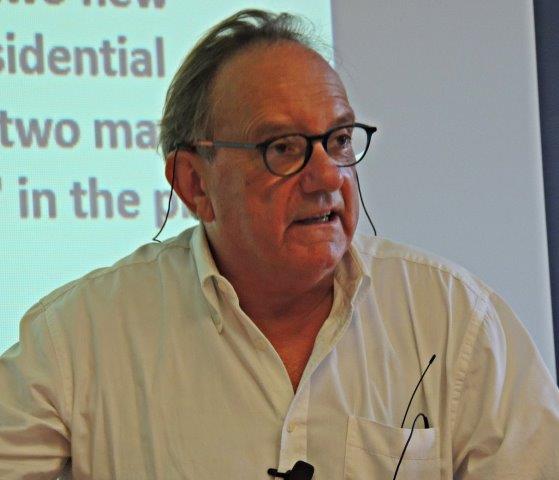| On 24th February 2016 'Sydney Ideas' at the University of Sydney, hosted a controversial event organized by the 'Sydney Network for Democracy' and the 'Australian Institute of Polish Affairs' (AIPA). Jan Pakulski, Professor Emeritus at the University of Tasmania and Collegium Civitas, Warsaw, presented a talk 'Is Democracy in Danger in Poland?' commented by Martin Krygier, Gordon Samuels Professor of Law and Social Theory at the University of New South Wales, co-director of the Network for Interdisciplinary Studies of Law, and Honorary Professor at the Regnet School of Regulations and Global Governance, Australian National University. Professor John Keane, Director of the Sydney Democracy Network, was chairing the session.
To enable broader access to this happening we provide transcript of the transparencies of the talk outlying the content of the lecture, links to the audio files recorded with kind permission of Prof. J. Keane, and links to the transcript of the audio files (thanks to the work done by Felix Molski). Comments and reactions of the event participants will be published separately in Puls Polonii and elsewhere. To balance somehow the partial views about Poland promoted among international students and Australians by Professors Pakulski and Krygier we are also providing links to several external sources.
Information from Polish League Against Defamation about true situation in Poland
'John McCain And His Pro-EU Pals Should Think Carefully Before Denigrating A Key NATO Partner' by Matthew Tyrmand
PiS and Poland's democracy
What Union does Poland want - opinion piece by minister Witold Waszczykowski
Is Democracy in danger in Poland
A short anatomy and History of the Polish “illiberal Shift”
Professor Jan Pakulski
University of Tasmania and Collegium Civitas
PDF:Transcript of the lecture and discussion
Audio recording of the lecture and discussion, Part 1
Audio recording of the lecture and discussion, Part 2
Audio recording of the lecture and discussion, Part 3
The Argument
1. The controversial moves of the PiS government weaken liberal democracy in Poland by undermining the rule of law, and by deepening the rift within the political class. This ends the “Solidarity consensus” not only about the “return to Europe”, but also about the rules of political rivalry.
2. These controversial policies represent an “anti-liberal backlash” mobilized by PiS. Democracy is not the direct target of this backlash. The attacks of the Kaczynski leadership are directed against the liberal policies, values and cultural standards, as well as against the liberal urban intelligentsia cultivating these values. Democracy suffers from the collateral damage caused by these attacks.
3. The backlash resembles “Orbanisation”, rather than “Putinization”. But the Polish illiberal shift also differs in many respects from the Hungarian one. Kaczynski and Orban differ in many respects.
4. The backlash resembles “Orbanisation” – a policy and cultural drift in the conservative, religious, nationalistic and Euro-sceptical direction – rather than “Putinization” – the strangling of both liberal and democratic institutions. But the Polish illiberal shift also differs in many respects from the Hungarian “drift”. Kaczynski and Orban differ considerably like unhappy marriage from Tolstoy’s Anna Karenina, Polish drift is illiberal in its unique way.
5. The Polish illiberal shift is the result of successful mobilisation by the PiS leadership of two new constituencies of support: the young “precariat” (Standing 2011), mobilized during the presidential campaign, and the old “pulpitariat” (mobilized during the parliamentary campaign). These two mass electorates have been anchored socially social categories of people who were “left behind” in the process of otherwise very successful Polish transformation.
The controversy
• The new Polish President and Government (which does not have “constitutional majority” of 2/3 parliamentary seats):
• Blocked the appointment to the Constitutional Tribunal, ignored the verdict of this Tribunal, and then proposed a “compromise” solution that violated the Constitution
• Pardoned the PiS ex-minister sentenced for illegal activities (and appealing the sentence) in order to clear his ministerial appointment,
And moved through the Parliament (some at night sessions) very controversial laws which
• Cancelled the meritoric criteria of top appointments in the Civil Service,
• Subordinated the public media to government appointments (declared unconstitutional), and
• Removed legal constraints to police/security surveillance of telephone and internet communication (declared unconstitutional).
• Supported the Kukiz15’ proposal of constitutional change that reduces the power of the CT to reject the legislation deemed unconstitutional (2/3 decision) – this was abandoned.

One slide showing the increase of the income or GDP after transformation is missing |

Professor Jan Pakulski |

Professor Martin Krygier |
The first comments (in Polish) by dr M. Baterowicz - click here
| 

